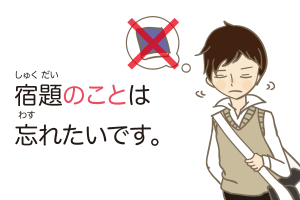Last time, you learned how particles work to indicate supplementary subordinate clauses, e.g. “先生はiPadを片手に授業をしている (The teacher is holding the class with an iPad in his hand).” Then, if you’d like to add a nuance of surprise like “Wow, the teacher is holding the class with an iPad in his hand!” what should you say? In this lesson, you will learn how Japanese interjection works with other emotional expressions.
The Usages of Japanese Interjection and Other Emotional Expressions
| Table of Contents Major Interjections Other Emotional Expressions |
Interjection (sometimes called “exclamation”) is a word used to show a short expression of emotion such as “wow” and “Oh.” They generally sound casual and are used in conversation. Some of them are related to slang like f-words and are not recommended you use it in public. Thus, the main purpose here is to become able to recognize interjections when native speakers use them with you.
Major Interjections
Surprise
ああ: Ah!
おお: Oh!
わあ: Wow!
嘘: No way!
マジで: Seriously? (very casual)
すごい: Great!
本当: Really?
げっ: Yuck, ack, gross!
きゃあ: *Feminine shriek
あら: Oh dear! (feminine)
おっと: Oops
がーん: *Sound effect for shock like “I’m shocked”
Words When You Call Someone
なあ: Hey (masculine)
ねえ: Hey (feminine)
あの(う): Excuse me
こら: Hey! (with a nuance of warning)
おい: Oi! (with a nuance of warning)
Discourse Markers
じゃあ / では: Well
さて: Now
さあ: Well, come on
Doubts
はて: well, let me see (when you wonder something)
あれ, えっ, おや?: What?
Responses
うん / はい: Uh-huh
ええ: Uh-huh
そっか / そうですか: I see
なるほど: I got it, indeed
へえ: Oh (with a nuance of surprise)
Fillers (*No Particular Meaning Like “Let’s See”)
あー
んー
えー
うーん
ええと
えっと
Curse
ちくしょう: Damn it!
くそ: Shit!
くそ野郎: Son of a bitch!
死ね: Drop dead!
Examples
Interjection is an independent word and can be used alone without any other elements such as particles and verbs. English translations don’t work well here. Thus, please focus on the category that we have placed above, e.g. surprise and responses, and try to figure out the meaning in context for each of the sentences below.
| おっと、道を間違えるところ(だった / でした)。 Oops. [I] was about to choose a wrong way. |
| ねえ、明日空いて(いる / いますか)? Hey, will [you] be available tomorrow? |
| (じゃあ / では)、もう(帰ろう / 帰りましょう)か? Well, shall [we] go to home now? |
| あれ?財布が(ない / ありません)! What? (I have realized) [I] have lost [my] wallet! |
| なるほど!だから日本語と韓国語が似ているんだ。 I got it! That’s why Japanese and Korean are similar. |
| あー、明日返事をしてもいい(ですか)? Ah… Can [I] reply [to it] tomorrow? |
| ちくしょう!二度と来るな! Damn it! Don’t come [here] ever again! |
Other Emotional Expressions
なんと / なんて: How Adjective It Is
| このチョコは | なんて | 美味しいんだ |
| Topic / Subject | Adverb | Predicate |
| How delicious this chocolate is. | ||
This sentence pattern is the counterpart to “how adjective it is” in English. なんと is a formal word and preferred in writing while なんて is a casual word and preferred in conversation. They can also modify nouns like “what a delicious chocolate is.” One important point here is that if the last word is not a noun, sentences have to end with the explanatory のだ. Even with nouns, sentences often end with the explanatory のだ.
| 井上さんはなんて美人だ。 What a beautiful woman Inoue-san is. |
| 田中さんはなんて頭のいい人なんだ。 What a smart person Tanaka-san is. |
| なんて速く走るんだ。 How fast [you] run. |
| 猫はなんて可愛いんだ。 How cute cats are. |
The end of sentences sometimes are replaced with のだろう, ことだろう, and ことか. The の is the explanatory のだ and the こと is the nominalizer. Therefore, you have to follow the conjugation rules respectively. The meanings are almost the same, but they sound more formal.
| 井上さんはなんと美人なんだろう。 |
| 田中さんはなんと頭のいい人であることだろう。 |
| なんと速く走ることか。 |
In practice, this expression is used with a lot of omissions.
| なんて美人だ。 What a beautiful woman. |
| なんて頭のいい人なんだ。 What a smart person. |
| なんて速く走るんだ。 How fast [you] run. |
| なんて可愛いんだ。 How cute. |
なんて can appear at the end of sentences and indicate your strong surprise. For the sake of understanding, you may treat なんて is a nominalizer and works like the topic particle は. Predicates are often omitted, but it should be something like “信じられない: unbelievable.”
| 野村さんが足が速いなんて[信じられない]。 The fact that Nomura-san runs is unbelievable. |
| 猫がこんなに可愛いなんて[信じられない]。 The fact that cats are cute like this is unbelievable. |
[adsense]
ものだ and ことだ: Expressing Deep Concern
| [私たちの子供も] | 大きくなった(もんだ / ものだ) |
| [Subject + Inclusion] | I-adjective + なる + ものだ |
| [Our kid] got big. *Said when you see your rapidly growing kid. |
|
With the above example, your feeling is ambiguous between happy and sad like “you are happy because you can see the growth of your kid, but you are missing her cuteness as a baby.” The combination between predicates and ものだ or ことだ determines the nuances. When you connect words which indicate change of things or people with ものだ, your speech indicates inexpressible deep emotion. In general, the emotion is not expressively told. You need to guess it. Note: the conjugation is the same as the nominalizer こと.
| 便利な世の中になった(もんだ / ものだ)。 The world has changed to the useful one. *You appreciate the new technology, but feel nostalgia for the tradition. |
| 身体の調子が悪い。歳をとった(もんだ / ものだ)。 [I] am under the weather. [I] have gotten old. *You’re missing your youngness, but satisfied with your life. |
When you connect words which indicate unusual events with ものだ, your speech indicates strong surprise which can be both praise and irony. This function almost always appears with the adverb: よく.
| 漢字がよくそんな上手に書ける(もんだ / ものだ)。 (Praise) How are you able to write kanji like that? |
| よくそんな点数が取れた(もんだ / ものだ)。 (Irony) How were you able to get such a (bad) grade? |
When you connect words which indicate desire like …たい and 欲しい with ものだ, your speech indicates hope with some concern.
| こういう服を一度着てみたい(もんだ / ものだ)。 [I] want to try to wear clothing like this once [in my life]. *You long for wearing it, but are resigned to wear it at the same time. |
| 次の大統領は優秀な人になってもらいたい(もんだ / ものだ)。 As for the next president, [I] would like a prominent person to be elected. *The current one isn’t good, so you’re expecting the next one with frustration. |
When you connect adjectives of emotions with ことだ, your speech indicates feelings toward events with some concern. ことだ is interchangeable with ものだ in this context.
| 子供がみんな結婚した。幸せなことだ。 All [our] children got married. [We] are happy. *You feel happy while looking back on the time when your children were young. |
| これまで病気になったことがない。ありがたいことだ。 [I] have never got sick. [I] appreciate [it]. *You appreciate it and hope to repay someone/thing for the fortune. |
When there are two sentences, you can make compound sentences by using ものだ and ことだ. Be careful; they will become …もので and …ことに. The last hiragana is different.
| 歳をとった(もん / もの)で、調子が悪い。 |
| 幸せなことに、子供がみんな結婚した。 |
Summary
- Interjection generally sounds casual and is used in conversation.
- Interjection is an independent word and can be used alone.
- なんて / なんと is the counterpart to “how adjective it is” in English.
- ものだ and ことだ express deep concern by connecting with predicates.
As for interjection, we recommend you imitate how native speakers use it. Interjection is one of the words that are evolving rapidly as people create coinage and slang. Thus, the grammatical rule is simple, but the proper use can be difficult. On the other hand, you may have found the grammatical rule of ものだ and ことだ to be difficult. In fact, they have several other functions, too. Next, you will learn more about もの and こと.





